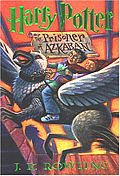
| Series: | Harry Potter #3 |
| Publisher: | Arthur A. Levine |
| Copyright: | October 1999 |
| ISBN: | 0-439-13635-0 |
| Format: | Hardcover |
| Pages: | 435 |
At last, a Harry Potter book about which I can say something positive other than that it's technically well-written.
That's not to say that, despite winning the Locus fantasy award in the year that it was published, this book is actually good. It's not. Pretty much all the flaws of Sorcerer's Stone and Chamber of Secrets are still here. Harry once again starts out with his abusive aunt and uncle, although at least he finally does something about that even though no one else in his life will. But Harry has to be kept trapped in his life situation so that Rowling can maintain her plot structure, so this is immediately followed by a bout of self-pity and terror of being expelled, making it clear that as much as he might fantasize about it, Rowling isn't going to let him do anything about his situation either.
Once we get past that and into the meat of the story, though, there are some definite improvements. The plot is considerably more complex (perhaps reflecting the older target audience) and features some nicely twisted bits at the end. Parts were rather too obvious, but some of the things that I guessed turned out not to be right, and I was favorably impressed by how everything was tied together in ways that made sense in retrospect but that I wasn't expecting. If only this plot could have been told in a world that wasn't senseless, solely plot-driven, stuffed with stereotypes, and set up to make Harry Potter look practically perfect.
One of the challenges of children's books is to find a good excuse for letting the children get in on the action without the adults solving all the problems. This can be a hard challenge, but there are better ways of handling it than making the children more intelligent and mature than the adults, which is what Rowling does. Harry and his friends constantly break the rules of Hogwarts (and the book makes it quite clear that the only bad part of this is getting caught, since nothing else bad happens to them because of this), figure things out the adults can't, and still are ignored or belittled by the adults until they work everything out. And in the end, in order to keep the structure that Rowling needs for her plots, everyone's attitudes towards each other haven't changed in any significant way and none of the teachers learn anything at all from what happened.
The characters are also depressingly stereotyped and narrow. For example, there's a near-total lack of female viewpoint characters — the best that we get is Hermione, the school know-it-all and nag who spends most of the first three books being infuriating. Gender roles are straight out of the 1950s, with all of the significant female adults being either mothers (typically stay-at-home in two-parent familes) or teachers. The divinations instructor is predictably a whispy woman who acts rather spacey, and Professor McGonagall is the stereotyped older female teacher, right down to having her hair in a tight bun. At least some of the female students do play Quidditch.
Race and class are almost as bad. For a wizard school that presumably pulls the best from all over a very diverse country, everyone is surprisingly white and middle-class except occasionally for their names, with fathers with typical white-collar jobs. Rowling gets some points for the whole normal-bred vs. pure-bred wizard conflict (mostly in Chamber of Secrets), which is obviously an attempt to deal indirectly with racism. However, given that it is repeatedly stressed that none of the normal-bred wizards suffer in the slightest from not having any introduction to wizardry before Hogwarts and cannot be distinguished from pure-bred wizards in any way, this attempt is little more than superficial and says nothing about the real, difficult challenges of societal racism, many of which would be perfectly comprehensible to children of the target age.
This book is an improvement, and I do have to admire the plotting and writing skill, but I continue to fail to see what any widely read fantasy reader sees in this poorly-thought-out, self-indulgent mess of a universe and its stereotyped, static inhabitants. Please, if you think this is the best children's fantasy has to offer, read the Oz series by L. Frank Baum (yes, there are 13 more after The Wizard of Oz, nearly all of which are significantly better). Or for charmingly didactic, try The Phantom Tollbooth, which also features a far better handling of its protagonist's desire to get away from his humdrum life. Or for that matter, read Lewis Carroll.
Whatever its features as a boarding school tale, the fantasy in Harry Potter never challenges anyone's assumptions, never requires the children to think, never takes a firm stand or contradicts something a parent might say, and never exposes the reader to anything coherent outside of their current thinking. It's all very fluffy and nonsensical in the way that causes adults to coo "how charming!" and rest assured that nothing here will require any intellectual work. There is so much better children's writing out there than this.
Followed by Harry Potter and the Goblet of Fire.
Reviewed: 2004-11-24